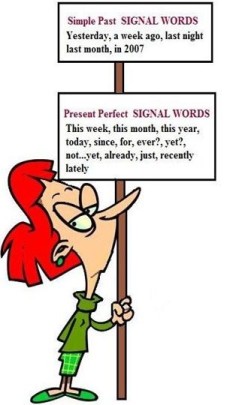SIMPLE PAST vs PRESENT PERFECT

Simple Past | Present Perfect Simple |
|---|---|
Irregular verbs: see 2nd column of irregular verbs Example: I spoke | Irregular verbs: have/has + 3rd column of irregular verbs Example: I / you / we / they have spoken.he / she / it has spoken |
Regular verbs: have/has + infinitive + ed Example: I / you / we / they have workedhe / she / it has worked
| |
Exceptions when adding ’ed’:
| |
Use
In British English, the use of Simple Past and Present Perfect is quite strict. As soon as a time expression in the past is given, you have to use Simple Past. If there are no signal words, you must decide if we just talk about an action in the past or if its consequence in the present is important.
Certain time in the past or just / already /yet?
Do you want to express that an action happened at a certain time in the past (even if it was just a few seconds ago) or that an action has just /already / not yet happened?
| Simple Past | Present Perfect Simple |
|---|---|
certain time in the past Example: I phoned Mary 2 minutes ago. | just / already / not yet Example: I have just phoned Mary. |
Certain event in the past or how often so far?
Do you want to express when a certain action took place or whether / how often an action has happened till now?
| Simple Past | Present Perfect Simple |
|---|---|
certain event in the past Example: He went to Canada last summer. | whether / how often till now Example: Have you ever been to Canada? I have been to Canada twice. |
Emphasis on action or result?
Do you just want to express what happened in the past? Or do you want to emphasise the result (a past action’s consequence in the present)?
| Simple Past | Present Perfect Simple |
|---|---|
Emphasis on action Example: I bought a new bike. (just telling what I did in the past.) | Emphasis on result Example: I have bought a new bike. (with this sentence I actually want to express that I have a new bike now.) |
Signal Words
| Simple Past | Present Perfect Simple |
|---|---|
|
|
Exercises:
- Certain time in the past or just / already / yet: Exercise 1, Exercise 2
- Certain event in the past or how often so far: : Exercise 3, Exercise 4
- Emphasis on action or result: Exercise 5, Exercise 6
- Mix: Exercise 7, Exercise 8
Test

3 comentarios
Estibaliz -
Andrés Aguado Drake -
Andrés Aguado -
My moom say to